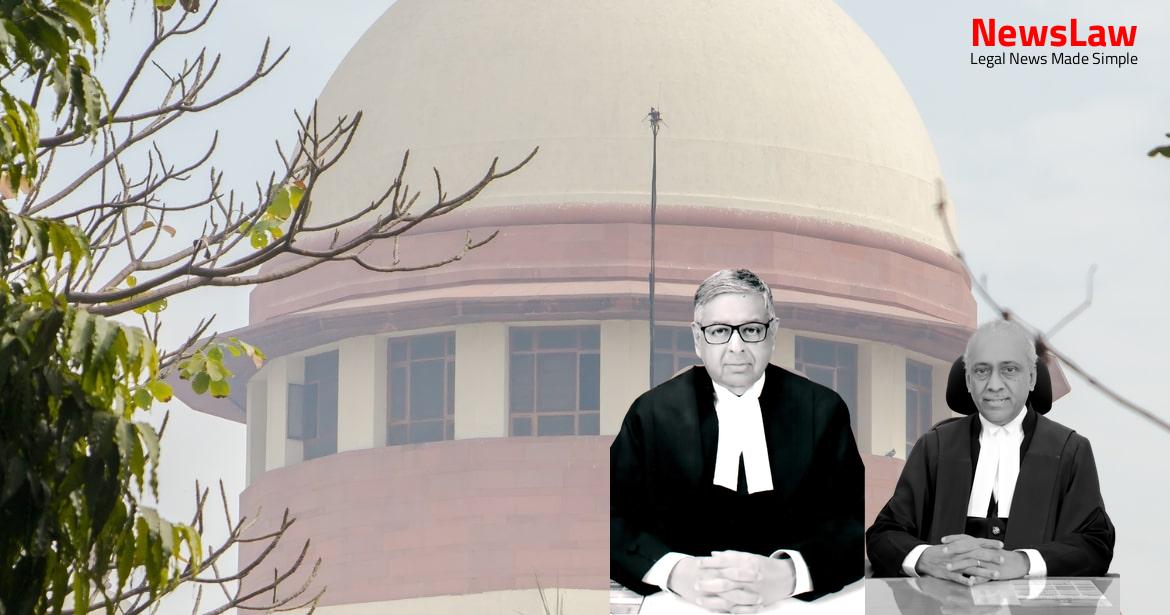Explore the comprehensive legal analysis provided by the court in a high-stakes dispute involving a debt determination audit in an infrastructure project. Gain valuable insights into the court’s interpretation and application of legal principles in this intricate case. Follow along to understand the nuanced legal complexities at play in this ongoing legal battle over financial obligations and project ownership.
Facts
- RMGL and RMGSL filed a Civil Miscellaneous Application seeking a direction to open the sealed cover containing the financial audit report of the debt due.
- HMRTC issued termination notices to RMGL and RMGSL citing Concession Agreement articles.
- CAG conducted a financial audit of the debt due but received no response from HMRTC or the State government.
- RMGL and RMGSL sought approval from Justice D K Jain for project handover.
- The audit report highlighted losses due to high interest costs and investigations into financial discrepancies.
- Allegations of incomplete audit and objections to the draft report were raised by HMRTC.
- HSVP failed to verify RMGL compliance with divestment requirements as per their agreement.
- Andhra Bank and Canara Bank were permitted to file responses in the case.
- Complaints regarding material breaches in the Concession Agreements were exchanged between the parties.
- Justice D K Jain permitted RMGL to handover control of Project No 1 to HSVP before termination.
- The audit report computed the debt due, taking into consideration the loan components and project costs.
- NCLT superseded the IL&FS board following allegations of prejudicial conduct.
- RMGL and RMGSL took actions in response to cure notices and termination directives from HSVP.
- A Writ Petition was filed challenging termination notices and seeking interim relief.
- The High Court issued notices on relevant applications and listed them for further hearings.
- The CAG report highlighted the audit scope for the debt due under the Concession Agreement.
- CAG submitted the financial audit report of the debt due which was completed as per the scope decided by CAG and submitted to the High Court on 19 November 2019.
- The High Court noted the affidavit filed by HMRTC’s Advisor (Planning) and the urgency conveyed by RMGL and RMGSL regarding the matter.
- A former judge, Mr. Justice D K Jain, was appointed by NCLAT to oversee the resolution process for the IL&FS group of companies.
- CAG ensured that the audit was conducted without conflict of interest, examined by their office, and completed as per the Concession Agreements.
- The draft audit report was submitted and finalized in a sealed cover to the High Court due to no response from HMRTC and the State government.
- Both parties agreed to a reference to CAG for the audit to determine the debt due.
- On 6 September 2019, the High Court directed RMGL and RMGSL to continue operating the rapid metro rail till midnight of 9 September 2019.
- Negotiations led to a consensus on 20 September 2019, resulting in directions issued by the High Court involving various senior officers of the parties.
- The agreed upon directions included the appointment of auditors by CAG to conduct a financial audit of the debt due and to examine the scope of the audit.
- Further orders passed on 4 October 2019 provided extensions and directions for the resolution process.
Also Read: Electoral Malpractices in Mayor Election
Arguments
- IL&FS group of companies have an FIR against them which should not affect the contractual obligation to deposit 80 percent of debt in Escrow Account as per High Court order.
- The amount will be deposited in Escrow Account with Andhra Bank and Canara Bank.
- CAG confirmed that the audit is complete and objections raised by HMRTC are baseless.
- RMGL/RMGSL handed over assets to HSVP and all disputes were to be settled in arbitration.
- The High Court cannot reopen the terms of the consent order.
- The CAG audit was conducted to determine debt due as per Concession Agreements.
- RMGL/RMGSL are classified as ‘red entities’ due to ongoing investigations.
- Specific allegations of fake invoices and higher project costs by RMGL/RMGSL.
- CAG audit was limited to ascertaining debt due but raised concerns of significant impacts.
- The amount deposited will follow directions from NCLT or any statutory authority.
- 80% of the debt due has to be paid to the lenders of Project No 2 as per the Concession Agreement.
- Lenders have no objection to handing over assets to HMRTC upon depositing the amount due in an Escrow Account.
- The deposit of 80% of the debt due equals 56% of the Projects’ cost.
- The outstanding claim of lenders of RMGSL was approximately Rs 1651 crores as of 31 July 2019.
- The debt due has been determined and must be deposited in the Escrow Account maintained by Canara Bank.
- Canara Bank and Andhra Bank provided financial facilities to RMGSL for the Projects.
- The debt due to the consortium led by Andhra Bank was approximately Rs 943 crores.
- The Projects were completed using funds from the lenders who are major stakeholders.
- Various credit facilities were provided by banks for Project No 1 and RMGL.
- An Escrow Account Agreement was executed between RMGSL, HSVP, and Canara Bank, with Canara Bank appointed as the Escrow Agent.
Also Read: Balancing Power and Transparency: Electoral Bonds Struck Down, Disclosure Mandated
Analysis
- The audit conducted by the auditors appointed by the CAG was limited to examining the debt due as defined in the Concession Agreements.
- It was clarified that the rest of the disputes between the parties arising out of the audit report were to be agitated in arbitration proceedings.
- The Financial audit of the debt due was complete and conclusive under the scope of audit as decided by CAG.
- The CAG would examine the scope of the audit of the debt due as suggested by both parties in terms of the Concession Agreements.
- The intervention by this Court under Article 136 of the Constitution was sought due to the derailment of proceedings before the High Court.
- The Audit reports on the debt due under the Concession Agreements with RMGL/RMGSL were finalized and placed before the High Court in sealed cover.
- The underlying wrongdoing allegedly conducted by the promoters in the erstwhile management of IL&FS needs investigation.
- Public interest element must be considered in ensuring that monies committed by banks towards infrastructure projects are secured.
- The Board of IL&FS was superseded, and now a new Board is in charge, appointed on the recommendation of the Central Government.
- The audit under the auspices of the CAG is considered incomplete and inconclusive due to other matters that may impact the debt due.
- The High Court exercised its writ jurisdiction under Article 226 in the case to prevent the disruption of rapid metro operations in Gurgaon, considering the public interest and potential hardships for commuters.
- Normally, the High Court would not entertain disputes that are arbitrable under Article 226, but in this case, it was justified due to the significant impact on the general public.
- Remedies are available under the Arbitration and Conciliation Act, 1996 for seeking interim directions either before the Court or the Arbitral Tribunal itself.
- The Comptroller and Auditor General (CAG) followed a fair process during the audit, including making a statement on the audit scope, appointing a firm of chartered accountants, sharing the draft report with involved parties, and setting deadlines for responses and objections.
- HMRTC and HSVP are reminded that they should have submitted their responses during the audit process.
- The High Court’s orders and directions should be followed as per the clear stipulations provided, and consequences should be accepted based on the CAG report submission.
- Invocation of writ jurisdiction of the High Court under Article 226 of the Constitution by HMRTC and HSVP was to challenge termination notices and avoid cessation of rapid metro operations.
- Arbitration clause in Concession Agreements provides sufficient remedies.
- High Court order dated 4 October 2019 clarified that disputes remaining after deposit of 80% of debt due shall be resolved in arbitration proceedings.
- Concession Agreements offer clear remedy for seeking reliefs through arbitration.
Also Read: Recall of Resolution Plan Approval: Legal Analysis
Decision
- The High Court’s order under Article 226 of the Constitution is to be resolved by granting liberty to the parties to exercise their rights and remedies in accordance with the law.
- Disputes regarding the correctness of the CAG report on debt determination can be raised in arbitral proceedings.
- Upon compliance with the directions, RMGL and RMGSL are to hand over all necessary documents to HSVP for the transfer of operations, maintenance, and assets as per the Concession Agreement.
- The writ petitions filed before the High Court by the respondents will be considered disposed of.
- The judgment does not affect ongoing investigations or criminal proceedings related to the IL&FS group of companies.
- Pending applications are also disposed of as per the judgement.
- The arbitration agreement in Article 30.2 allows parties to pursue their rights and remedies, including matters under the arbitration agreement.
- No costs order has been made, and the appeals are disposed of as per the provided directions.
Case Title: RAPID METRORAIL GURGAON LIMITED ETC. Vs. HARYANA MASS RAPID TRANSPORT CORPORATION LIMITED (2021 INSC 221)
Case Number: C.A. No.-000925-000926 / 2021



